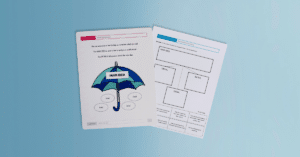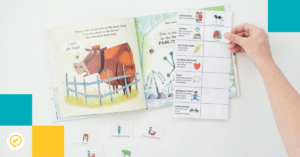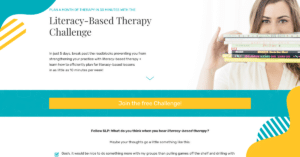Listen on Apple Podcasts Listen on Spotify
This month, Monica and I are talking about phonological awareness. 🎉
Last week we did a quick review of phonological awareness and why is it is so important. We learned PA is very important for future reading skills and all students can benefit from phonological awareness intervention.
This week we will focus on PA assessment and how to create goals to target PA.
Phonological awareness is your ability to “identify and manipulate units of oral language: words, syllables, onsets (beginning sound c in cat) & rimes (end sounds -at in cat)”.
Let’s get to it!
Assessments and Tips discussed
– You can find screeners on PTP to see where students are with PA
– If a teacher or RTI instructed has already done a screener, collaborate with them and review their notes. Work smarter not harder!
– Reach out to parents to see if they have any concerns
Example Goals Discussed
– When given a CVC word orally as a prompt and asked to identify which position a particular sound (initial. medial, final) in the word is in (example: “Say the word tap. What is the medial sound in “tap”?”), STUDENT will identify the sound being requested for each prompt with 80% accuracy in 2 out of 2 trials as measured by teacher-made assessment.
– When given the onset and rime (/b/ + /at/ , /h/+/ot/) for 10 different 3-letter short vowel words (CVC words), STUDENT will blend those sounds (onset and rimes) into words with 100% accuracy in 2 out of 2 trials as measured by teacher-made assessment.
– When given 3 phonemes as a prompt (example: /c/ /a/ /t/ or /p/ /i/ /g/), STUDENT will orally blend those phonemes into words with 80% accuracy in 2 out of 2 consecutive trials as measured by teacher made assessments.
Links Mentioned and Additional Research
– FREE: The PAST Test Screener : David A. Kilpatrickby
Basic Syllable
Onset-Rime
Basic Phoneme
Advanced Phoneme
– Hello Two Peas In A Pod (TPT): Free PA Assessment
– Cabbage Et al article (Decision Tree + Sample Assessment Checklist)
– Test for multisyllabic words! Can they blend them together?
Subscribe & Review in iTunes
Are you subscribed to the podcast? If you’re not, subscribe today to get the latest episodes sent directly to you! Click here to make your listening experience auto-magic and as easy as possible.
Bonus points if you leave us a review over on iTunes → Those reviews help other SLPs find the podcast, and I love reading your feedback! Just click here to review, select “Ratings and Reviews,” “Write a Review,” and let me know what your favorite part of the podcast is.
Thanks so much!
Transcript
Marisha: Hello there, and welcome to the SLP Now podcast, where we share practical therapy tips and ideas for busy speech-language pathologists. Grab your favorite beverage and sit back as we dive into this week's episode.
Marisha: Hey, there SLP. This month, Monica and I are diving into all things phonological awareness. So in Episode 98, we did a quick review of what phonological awareness is. We're going to spend the rest of the month talking about assessment, goals, treatment ideas, all sorts of good stuff. So, without further ado, let's dive in to this week's episode.
Marisha: Let's spend a little bit of time talking about assessment and goals and what that might look like. Like you said, in California, things are a little bit different. So can you tell us a little bit about what that looks like for you?
Monica: Yeah. So, specifically in my district, SLPs don't really do the formal assessment or write the goals or provide the services because we have either reading specialists for RTI, or our classroom teachers who provide that specialized academic support do that. Either pulling from the gen-ed classroom, or for students who are either in our co-teach classes or separate classrooms, they all do that. So, I do a lot of collaborating.
Monica: But, we do have a state dyslexia guideline and it says that SLPs can play a role in the dyslexia intervention. So, they have a description of what SLPs can do, and then ASHA also says that we have a major role and responsibility to play in this, to support spoken language skills and written language skills as well. But I feel like that probably also if you are going to become a dyslexia specialist, you have a full lot of different CPU's to do, I feel like to specialize. But I feel like, there are a lot of things that we already do in speech-sound disorder intervention, that we just can add a couple of things in to be able to target that.
Monica: But for right now, my role in my particular school is really just to make sure I screen those speech-only students, kind of looks like checking back with the teacher, checking to make sure if they're getting RTI for reading, to make sure I'm talking to that teacher, asking the parents if they have any concerns for that. And then, I just do a little bit of informal assessment with it. And then during intervention I include a little bit of phonological awareness in that. I'm not doing that whole long list, I'm not hitting every single one of those, I just do the ones that are really easy to incorporate. And then if the teacher or the RTI person, or whoever it is that's working with that student, they'll email me and say, "They're having a really hard time with this specific area." Maybe the carry over from blending their words, or something isn't happening over in the classroom, so they'll give me a couple words. They'll say, "They're having a really hard time with these sounds." And so that's what role I play within my school.
Monica: And, I think that I probably also focus on it a little bit more because I have mainly kindergarten to second grade. So, it's really those grades where they're focusing on it, so I might be focusing on it more so than another SLP.
Marisha: That makes a lot of sense because every state will have a different setup, but especially in California where they have those specialists, and it sounds like your district has awesome RTI supports and everything too, but just keeping an eye out for things. So, like if we get that speech-only student, maybe we can run through a quick screener. There's a bunch of screeners available on Teachers Pay Teachers, or if you just search Phonological Awareness, basically just need to run through the activities and see where students are with that. And then just collaborating with the team to see, we'll use their expertise and do the legwork and just do what we can to support. I think that's a really awesome approach.
Marisha: And then if we happen to do a quick screening and that student, for some reason, isn't getting RTI yet, we could also refer out and help with that identification so students don't get missed.
Monica: For sure. And then we'll have linked, it's called the PAST test. This is by David Kilpatrick, and then it's a free screener. And on there is basic syllable, onset-rhyme, basic phoneme, and then advanced phoneme, if you just want something that's free and already put together.
Monica: And then the Cabbage et al. article has a sample assessment checklist in the appendix of their article as well, for things that you could include in your assessment if you just want a more in depth guideline to go through, if you really, really think that this is an area that you want to focus on for that student. Their article also has a decision tree for referral for your Student Support Teams or extra intervention, if this is something that you would like a decision tree for, and a little bit of extra support with that.
Marisha: That's some really good resources, definitely have to highlight those in the show notes.
Monica: For sure.
Monica: But, I think similar to what you were talking about, I definitely pull from the classroom teacher or RTI instruction, like our classroom teachers do the DIBELS. And so there's a lot of information in there, so a lot of times you don't have to do extra screening. I'll just take from whatever they do in the classroom. And then if we're doing a full evaluation, the psychologist or the academic specialist, they're usually doing a lot of phonological awareness testing, and so then I'll just pull from that and then I don't have to do my own.
Marisha: Yes, work smarter, not harder. Awesome.
Marisha: We talked about some different informal assessment options. Was there anything else that you wanted to point out?
Monica: So in that Cabbage article for the effectiveness of early phonological awareness interventions, they talked about different articles and different research for where you could focus your testing on. And then they showed that rhyming, blending, and segmentation tasks, especially rhyming and the ability to identify phonemes, were the most important meta-phonological skills for preschoolers to have that predicted reading and spelling abilities in first graders.
Monica: And then they talked about including receptive tasks for children who can't respond verbally. And so for students who might have a more severe phonological disorder, to be able to see if they, you know, if you want to know if they have some sort of knowledge for clusters, to have "Which one is spoon?" It has the sp- blend and then have three different pictures. And then to test for multi-syllabic words to see if they can blend them together, have non-word repetition tasks to test for phonological awareness, and then to do it for your initials as well as exiting, just to make sure. And not necessarily to keep them, you could be exiting a student, but then just to make sure that you refer them to the appropriate services.
Marisha: Awesome. Is that our list of informal assessment?
Monica: Yeah, I think that pretty much covers it.
Marisha: This is always a super common question, but what about goals?
Monica: Yeah.
Marisha: I know it's a little different with what you're working on in California.
Monica: It for sure is. So, I'm never specifically on those goals, just because ed code doesn't list out reading for SLPs, but it could be different for your state. You could be in private practice. I have some example goals, but also, I don't think that you need a goal to work on this. You just need to incorporate it into speech-sound disorder treatment, which we can talk about in a little bit. But one example goal is when given a CVC word, they'll be able to identify which position a particular sound is in the word. So initial, medial, or final. So, if you have to say the word tap, what's the medial sound? What's the middle sound? Or if given the onset and rhyme for 10 different CVC words, that they'll blend the onset and rhyme. So it's like, "What word is this? B-at." And they have to say bat.
Monica: Or another one could be the almost opposite of that. So if I say, "C-at, what word is that?" And for them to blend it. Or you can have the opposite, "what are the three sounds?" So they have to segment it as well.
Marisha: And we'll put some example goals in the show notes, if you're looking for some inspiration.
Marisha: I love what you were saying, because we might not have an actual phonological awareness goal, but if we have a goal for a student to reduce cluster reduction or to reduce fronting, or if they're learning a specific sound, we can incorporate this approach as a means to get towards that goal. Because there's plenty of evidence to show that that works. I like that perspective, that's helpful. Anything else you wanted to talk about when it comes to goals?
Monica: No, I don't think so. This is definitely where I end up working with the reading specialists, we call them RSP teachers in my district. But we'll share materials, or if there's a student with a severe phonological disorder, they'll be like, "Where can I start working first? What sound are you working on? So that I can make sure that I'm targeting that extra." Or they'll say, "This student says this phrase a lot in my classroom and I can't understand them when they're saying this." So, I can pull that and make some of those the target words, and then do phonological awareness with that, because sometimes they'll have a book or sight words or something that they're testing all the time. And it's something that the student has to do frequently. That's a good way. I feel like for me, that's worked to be able to work together with them.
Marisha: Awesome. So I think that's a wrap on our mini list through assessment and goals. So yeah, that was super helpful, and hopefully everyone feels like they've got a good grasp on where they can get started with that.
Marisha: Thanks for listening to the SLP Now podcast, this podcast is part of a course offered for continuing education through speech therapy PD. So yes, you can earn ASHA CEU's for listening to this podcast. If you enjoyed this episode, please share with your SLP friends and don't forget to subscribe to the podcast to get the latest episodes sent directly to you. See you next time.
Sign up to receive email updates
Enter your name and email address below and I'll send you periodic updates about the podcast.




Reader Interactions